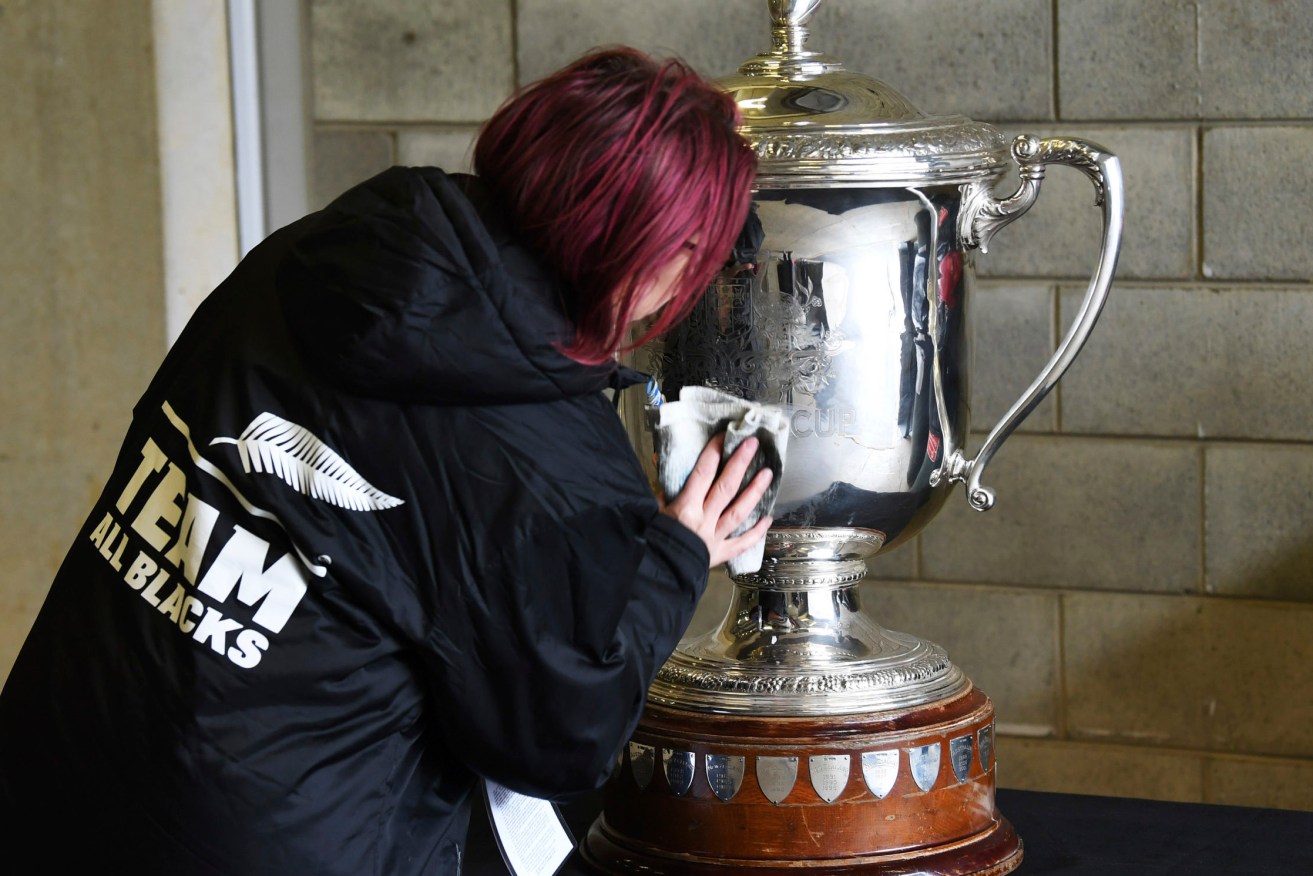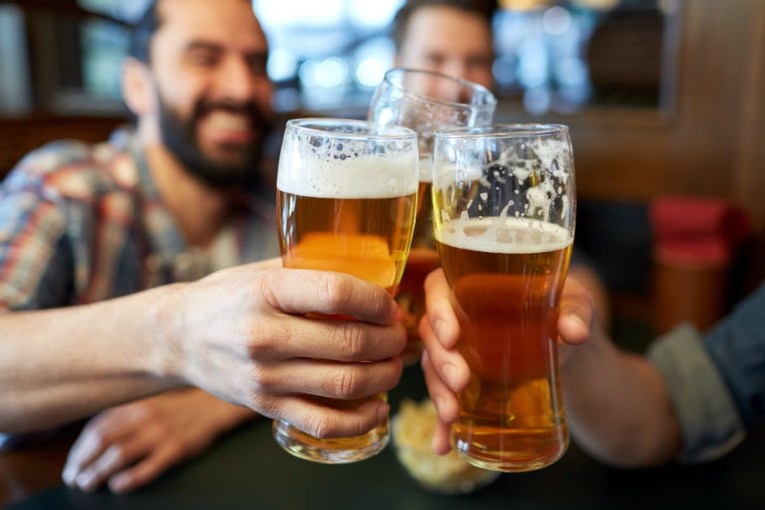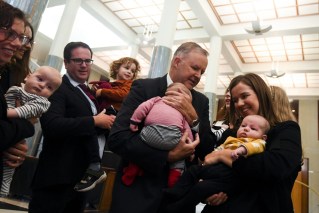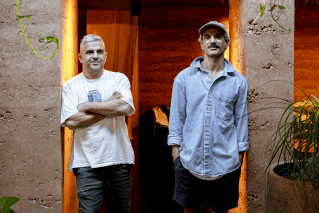When confidence takes the place of arrogance, suddenly the future isn’t All Black
Long-suffering Australian rugby fans – for more than a decade equally in envy and awe of the team culture that sustains the mighty New Zealand All Blacks – at last have some reason for optimism, writes Michael Blucher


A staff member polishes the Bledisloe Cup ahead of the rugby game between the All Blacks and the Wallabies in Wellington. (Andrew Cornaga/Photosport via AP)
You may have seen the footage on social media, the rare peek inside rugby’s “inner sanctum”.
All Blacks captain Sam Cane, presenting Michael Hooper with a magnum of fine New Zealand red, to mark the Wallabies skipper’s milestone of 100 Tests for his country.
🤝 What it’s all about. Thanks @allblacks. #Wallabies #BledisloeCup #NZLvAUS pic.twitter.com/P98SBr0B58
— Wallabies (@wallabies) October 11, 2020
Generous applause from the other ‘Blicks, then a gracious and humble response from Hooper.
No, the players don’t really hate each other. Not all the time, anyway. Any bad blood between the two teams is confined to the 90 or so minutes on the field, when the said blood is being spilt – all in the name of national pride and off-field bragging rights.
Then as quickly as it disappears, civility returns. Fierce on-field combatants share a beer, a yarn, get to know one another. They’re part-time enemies, but full-time peers, professionals just dressed up in different suits, working in different offices.
A sense of camaraderie – rugby has always had that going for it, though at different times, in different countries, it’s been temporarily suppressed, perhaps by a cantankerous coach or a bitter individual rivalry. As a result, the teams drift apart, before gradually gravitating back together. Kindred spirits, reverting to type.
Rugby players the world over are cut from the same cloth, particularly the props, those said to be not born but instead quarried. How could they not develop some sort of professional affinity? They spend the majority of games wrestling, their eyebrows brushing against those of their opponents – more intimate than a lot of marriages.
One of my favourite rugby front-row exchanges – Wallabies hooker Brendan Cannon and his Kiwi arch-rival Keven Mealamu belting the bee-Jesus out of each other in a Bledisloe Cup Test in Wellington in 2004. As a result of the incessant niggle, both were sent to the sin bin.
For five of those 10 minutes, they’re lying side by side in the medical room under the grandstand at Westpac Stadium, getting stitched up by their respective team doctors. “How the wife and kids, Canno?” Mealamu asks. “How many you got now? That right, eh? Gee, busy times. Bet like me you’re getting plenty of grief for being away from home so much. Chat, Chat. Anyway, see you back out there, Bro.” And off he toddles.
The pair hadn’t been back on the field two minutes and WHACK! Kevvie snots BJ again. Right in the chops.
After the game, brothers in arms, during the game, swinging arms.
In a slightly more recent era, Wallaby utility Berrick Barnes tells of puncturing his lung during a Test Match against the Springboks in South Africa.
Unable to fly on to Argentina for the Wallabies’ next Rugby Championship match, he stayed in Johannesburg where the All Blacks were preparing for their game against the ‘Boks the following Saturday.
Barnes spent the week with the Kiwis, he was invited to dinner by the coaches, he even travelled on the team bus to training. Before of course, he flew back home where a few weeks later, during a Test Match in Sydney, he once again became an All Black punching bag.
The Kiwis – brutal but respectful, able to see a bigger picture.
There’s probably a couple of reasons for the juxtaposition, this curious mix of conviviality and pugilism. One is familiarity – the players know each well. They encounter one another regularly throughout the season, – whether it’s at provincial or international level. Genuine friendships form.
The other more potent factor – most international coaches and captains understand the importance of respecting the opposition, both the player and the human being.
By not doing so, they run the risk of underestimating them.
Therein lies the fundamental difference between confidence and arrogance.
Confidence comes from knowing you’ve put in the work, you’ve honed the necessary skills, and that you’ll be able to reproduce them instinctively, when it counts most.
Arrogance is the dismissal of your opponents, simply believing that you’re better than everybody else.
For the past 10 years, the All Blacks clearly have been better — miles better, as much as it pains us Aussies to admit it.
They might have had bad days, but they never dismissed their opponents.
On top of the presence of some pretty special athletes, the major foundation of that New Zealand success has been team culture.
With leaders like Richie McCaw and Dan Carter at the helm, the All Blacks – and the individuals that make up the sum of the parts – were rarely if ever allowed to get ahead of themselves.
One small insight – a few seasons ago, the Australian netball team was staying in the same hotel as the All Blacks in Sydney.
The Diamonds observed the players at breakfast, helping elderly patrons by carrying cups of tea to their table, plucking toast out of the toaster and passing it on a plate to women with young children.
Two of the Diamonds – senior players – looked at each other. “Wow. That’s respect right there. Maybe that’s what we should be doing,” one of them suggested to the other.
You can dismiss it as a charm offensive, or you can take it for what it is. Intense pride in the jersey, and from those setting the standards, a genuine belief that “better people make better All Blacks”.
It’s long been the Kiwi rugby mantra.
Clearly, over the past 10 or so years, the Wallabies haven’t been great. At least not consistently. Lots of good individuals – good people – just not great as a team. On-field results at best patchy, at worst demoralising, for those watching as well as playing.
Yet last Sunday, a lot of long-suffering Wallabies supporters caught a glimmer of something very different, and potentially, pretty special.
The 16-all draw against the Kiwis, in the international rugby graveyard that is the Wellington “cake tin”, was a result very few were expecting.
One gritty 90-minute effort, of course, doesn’t erase the Kiwi dominance of the past decade, nor does it instantly elevate us to their status as rugby union’s standard-bearer.
But it does generate hope.
And in light of the recent imbalance between the two countries, that’s all Australian rugby fans are looking for at the moment.
A new coach, a new breed and new standards of excellence.
All adding up to new hope.












